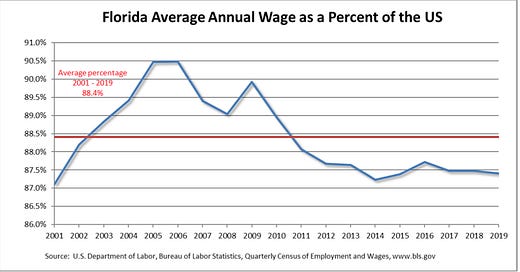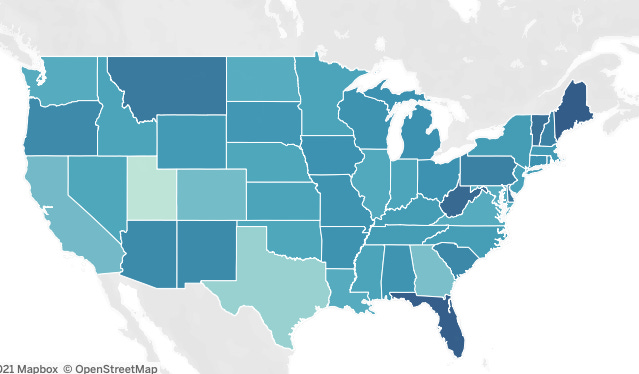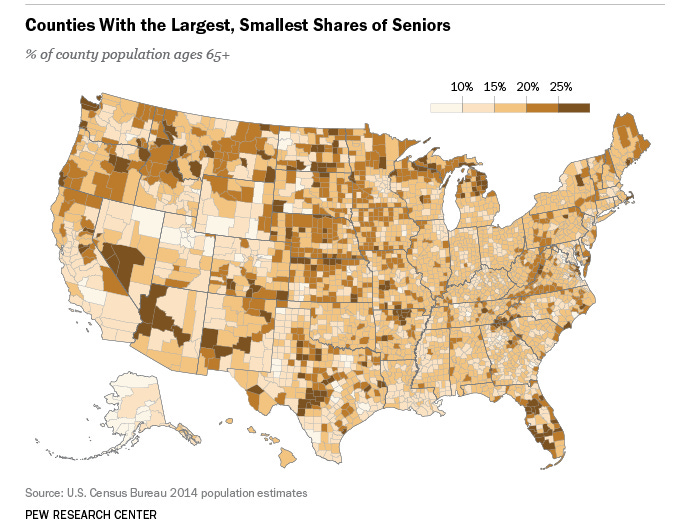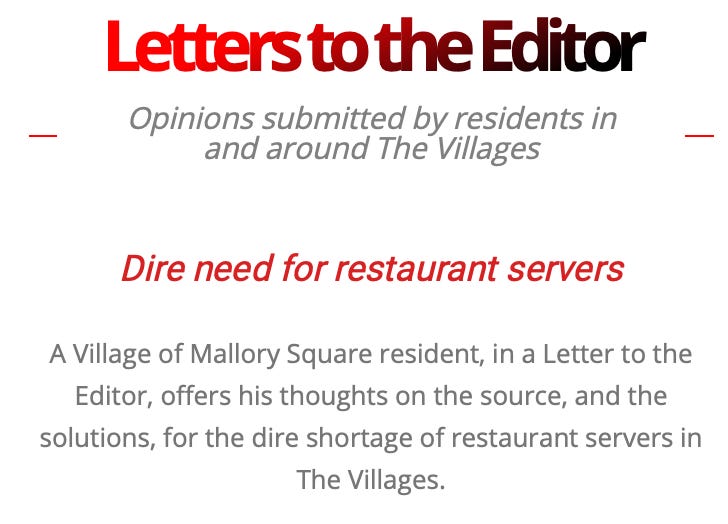Florida's modern sharecropping economy has finally caught up with its capital and employers
Florida is quickly becoming a much older, less creative version of California, with none of the homegrown industry or attempts to recruit, develop, and serve a future.
The Lakeland Chamber of Commerce is holding an “Unemployment Round Table” discussion this week to “to identify how to best serve our business community and its hiring needs.” Key quote:
Recently, the Lakeland Chamber of Commerce received feedback from several investors expressing a concern over their inability to staff open positions. Many factors have contributed to a large hiring need with a limited applicant pool.
First, it’s curious they’ve called it an “unemployment” round table, when staffing open positions is the problem they’ve identified. I suspect it’s a hint that this will be two hours of “lazy worker” and Democrat bashing.
But for actual answers, the Lakeland Chamber might turn to that woke, left-wing, communist organization known as the Florida Legislature. It has a very clear explanation for why your local businessfolk can’t hire anybody. It has everything to do with math and Florida’s long-standing political and macroeconomic choices. It has nothing to do with federal unemployment policy or the gumption or moral drive of Floridians — especially working-class Floridians.
Florida: very, very old; very very low wage; and now very expensive
Take a look at Florida: An Economic Overview, a Dec. 2020 report from “The Florida Legislature Office of Economic and Demographic Research.” And then look at these two images from it.
Florida’s “average” wage has never in recent memory reached higher than 90.5% of the US national “average” wage; and it’s been dropping for the entirety of the Rick Scott era as governor and senator. This is “average,” not “median” wage, which means the graph is worse than it even looks. The median wage is likely be much lower because Florida has a lot of extreme wealth to pull the “average” up. The gap between average and median household income in Lakeland is fascinating. The average is always much higher than the median. (That’s an article for another time.)
Now take a look that this map/image of states by age. The bluer, the older. Link to interactive map here. 20.5 percent of Floridians are 65 or older. Only Maine (20.6 percent) is slightly older. No other American state is at 20 percent.
The sunbelt high growth/high population states most often thought of as our peers and competitors — California, Texas, Arizona, Georgia — are waaaaayyyy younger. Even Arizona, one of America’s oldest states, is only 17.5 percent 65-plus.
There is nothing like Florida. There has never been anything like Florida, to my knowledge. Modern Florida is a state economic and social and governing model never before tried in this country, performing a very strange experiment in real time: how much public and private service capacity can capital both consume and destroy while still sustaining the value of that capital?
This is a run to destruction model of state life.
So for the “concerned investors” of the Lakeland Chamber, all I can say is you get what you pay and vote and campaign for. Some of us have tried to tell you.
Rick Scott’s modern sharecropper economy
Florida brags endlessly that it is awash in imported money and capital. Every single grifter state policy of the Rick Scott/Ron DeSantis era has been designed to import capital and make sure it does not trickle down to the people who service the imported capital so the service remains cheap for the owners of capital and thus continually attractive for importation.
That’s the Florida cycle. It isn’t just immoral; it’s business foolish and unsustainable for a state.
You could, in theory, make a low median wage, high capital economy sustainable if capital recognized that the humanity of labor is vital to its ability to serve capital. You might make Florida work for the future if capital spent the money needed to build high quality capacity and infrastructure for its median wage workers to use in servicing capital and developing their own lives and families.
That means, among other things: affordable housing, transportation, child care, and developmentally rich public education. Economic and political power in Florida does none of that. Instead, it destroys all that and then wonders why all the lazy people who don’t exist aren’t clamoring to take the garbage jobs for which there aren’t enough people to begin with. Florida’s only real labor development policy is coercion and indenture — through cruel and broken unemployment systems.
Our state’s only traditional saving graces for capital to recruit labor have been sunshine and — until now — relatively cheap housing and real estate. The sunshine is getting hotter; and cheap real estate and living is changing rapidly — and is perhaps already gone. Florida was recently ranked as the 7th least affordable state housing market. Key excerpt:
The gap between median income growth and median housing cost is stretching out fast like a rubber band pulled from opposite ends. It will have to snap back together at some point.
Rick Scott and Marco Rubio and Ron DeSantis and Richard Corcoran — and the capital interests that empower them — have turned Florida into a much, much older version of the bad elements of California. And they have created none of the home grown industry or dynamic opportunity for the young — except what the federal government spends on the space program.
Instead of creating capacity that Florida capital could easily afford to develop the labor it needs, Florida political and economic capital has built and fought to maintain a modern sharecropper economy. Florida runs on subsistence servicing of the transplanted elderly, beach visitors, or Mickey Mouse.
When you add up the monthly cost of child care and maintaining a vehicle and car insurance (a massive negative capital force on the young and capital-poor that isn’t talked about enough) on top of rising housing costs, many workers actually lose money servicing capital in Florida’s low wage economy. People, especially women and young workers, make $10/hour to try to buy the capacity that allows them to work each day. Paying to work for the right to subsist is the essence of sharecropping.
Indeed, working is often an act of labor charity toward the owners of Florida capital.
Ask restaurant workers how many of their bosses are personally begging them to cover open shifts today. Begging is charity. If you’re a Florida business owner or manager relying on the charity of your service industry sharecroppers for labor, you don’t actually own or operate a business.
It’s hardly surprising — in a COVID era in which Florida capital and power has shown it does not care if labor lives or dies — that individual human units of labor would reassess their generous donations to capital owners that have such contempt for their lives and humanity.
One can be a hard boiled capitalist and still see the self-interested, business logic of this clearly.
Florida’s consumption-to-capacity ratio is going to get increasingly worse until capital gets its act together
Come back to the Legislature’s report; and look at that top part.
[I’m increasingly of the view that there is no such thing as “unskilled” work. A better way of putting “highly educated and skilled workers” is “highly credentialed and specialized workers.” Those are different meanings. Moreover, you are seeing shortages in basically all jobs, especially those the robots are supposed to take.]
When you see the word “retiree,” you should actually see “a unit of capital dedicated to consumption of capacity, not creation of capacity” that must be serviced by labor.
The increasingly problematic American capacity creation (worker)-to-capital consumption (retiree) population ratio is 4:1. Florida’s is already just 3:1 and plunging.
Florida’s disproportion is even more acute because we do nothing to develop our own capital or capacity. It’s hardly surprising that America’s oldest large, wealthy, growth state also has America’s worst funded and worst operated state school system. And any education capacity growth or sustenance in recent years has come from local taxpayers taxing themselves, not the destructive state government.
In fact, our state government is right now aggressively dismantling what remains of state public education capacity and replacing it with nothing except unbelievably bad voucher program schools with a 61 percent 2-year program drop out rates. See this video.
Now that citrus is mostly dead, one can argue that the $1 billion annual voucher grifting industry is the only indigenous Florida industry nominally built around creating a product to sell at scale. And the voucher industry is almost entirely a grift that depends on pure fraudulent marketing and consumption while creating no value.
It is the quintessential modern Florida industry in that way.
By contrast, retirement and tourism are not open grifts; but they don’t develop capital and capacity either. They consume; and they are Florida’s sustaining “industries” now.
Most Florida retirees have relocated from the place where they built or inherited their capital so they can spend it down in leisure here. Thus, there aren’t just more of them relative to the country; they are wealthier, which is putting greater demands on Florida’s non-existent capacity than other states.
Moreover, Florida’s politicians and business “leaders” have told the transplanted elderly that they don’t actually need to sustain the capacity that services them. It just kinda happens magically. It’s the Disney state after all.
Thus, Florida’s 3:1 ratio is more demanding of service capacity per human unit of capital and labor than America’s 4:1. Florida’s consumption-to-capacity ratio is a crisis at both the macro and the individual level. It’s why both Florida’s wage collapses and growth rates relative to the country as a whole cannot last. One, or both, will have to give. In fact, growth has already slowed, which is why we only got one more Congressional seat in the last Census. And your favorite restaurant or the folks looking after your parents still can’t hire anybody.
True anecdote: Earlier this month, my Dad spent a week at a beachfront condo near St. Augustine as respite/vacation from the assisted living home he shares with my mother. My sister hired a company to provide 24/7 support. One of the two women who split the shifts had been flown in from Ohio for the week, specifically for this job, by the owner of the company, who is apparently a friend. Her background wasn’t as a health care worker; it was a bar manager. It’s not clear to me she had any health or elder care training at all. She was also great. But look at the cost and capacity shortage built into that. And my Dad has comfortable amounts of capital available to support him.
Will women come back into the workforce if they have to pay for the privilege of serving ungrateful capital, while sacrificing their families?
Moreover, COVID has forced a true reckoning with Florida capital’s contempt for human labor — particularly the lives of women. A large portion of women seem to have gone on general strike — unwilling to pay for the right to service capital outside the home. If they’re going to lose money, they can do it in the service of their own families. That’s pretty reasonable logic.
This is similar to the teaching shortage “strike” that existed before COVID and will get much worse after Florida political capital’s incredibly stupid and destructive approach to COVID education. Opening schools in the same dead, stress-inducing Florida Model gave DeSantis a short-term political talking point that will be irrelevant by ‘24, if not ‘22.
In exchange, he burned up much of Florida’s medium and long-term education capacity. Florida is basically creating zero new teachers while trying to get rid of what’s left of the experienced education force. Watch the shortages that continue to deepen. Polk County already had massive teacher and bus driver shortages, while neighboring Hillsborough is destroying its future capacity because of state underfunding.
Whatever you think of Joe Biden or Democrats, all of their recently announced plans — from universal day care to child care allowance — revolve around trying to either compensate parents for unpaid care work or make it cheaper for them to work outside the home. That is something any smart employer should be cheering — or at least engaging.
We despise you; so come work for us ¯\_(ツ)_/¯
In Florida state government, by contrast, I assure you that the only plan to get women out of the household and back into the low wage service industry workforce is to inflict systemic pain.
The powers-that-be already tried that and failed with the broken unemployment system, which made pandemic life in Florida worse for people who lost jobs than in other states. No state has been more work coercive than Florida in the COVID era. And yet, here we are…
State political and business leaders are going to try even harder. They will do everything they can to make caring for your children or household more painful than paying to work in a restaurant or clean up the messes of the elderly while they make you watch Fox News.
“Well, you shouldn’t have had kids.” I can hear the libertarian inheritance babies talking now.
And believe me, if the powers-that-be in this state are happy to restrict your vote and make it easier for angry dudes to run you down in the street, they will eventually get around to regulating who gets to raise Florida’s children. The path of our state’s current political and economic logic ends with forcing women to risk their lives to give birth then turning the children over to people with acceptable amounts of capital to raise them as low cost labor. Mark my words. Some lawmaker will start talking about it. Sabatini’s a good bet.
Anyway, try to recruit labor with all that in a state rushing toward a 2:1 worker-to-retiree ratio. Put this in an ad:
Please come to Florida where we have the worst, most stress-inducing American state education system for your kids, housing is really expensive, we have no transit, and we make your home life as difficult as possible so you’ll slave for $12/hour as a chicken finger line cook.
Good luck with that, Chambers of Commerce.
Indeed, expect to hear a lot less complaint about “illegal” immigration in the coming years. When money and the value of capital assets are really at stake, watch how quickly “Build the Wall” becomes “Build the Boat” for the people who own the assets.
A Great Migration moment
I expect Florida to go through wrenching economic and social change in the next 10 years. I’m not sure exactly what form it will take; but elected politics will play only a tiny role, if it plays any role at all. I would compare this period to the Great Migration of exploited, low wage black laborers out of the South to the WWI-born industry of the Northern cities starting in 1915.
The Great Migration — which capital tried very hard to restrict through violence and law alike — blew apart Florida’s and the South’s racial and labor structures over a period of 30-40 years. This was true particularly in agriculture. It caused wide-ranging economic and social change for the country as a whole. A better economic historian than me could confirm; but the Great Migration is likely what ended literal sharecropping as an economic system.
Florida’s economic and social model is far more different from other states today than it was in the Great Migration era; so we will feel this change more powerfully than will other states. Indeed, this “Great Migration” is going to be Florida-specific, I would say.
Florida’s retirement and tourism industries — the addiction to the imported, perishable capital of the elderly and short-term visitor — has similar business rhythms to agriculture. Indeed, one hears the phrase, “we’re going to grow houses” quite often from former farmers who have sold land to developers.
The imported capital of the elderly, particularly, has to be continually tended, harvested, and replaced by new imported capital. It’s a crop rotation system that depends on Florida being a good enough place to live to keep drawing new crops of migrating elderly.
And yet, we do nothing to maintain our soil.
Cost spikes and capacity shortages don’t market very well once people start to experience them. If you have portable capital, you can find sunshine and beaches — or mountains — in a host of other states when Florida lacks the capacity to service you.
Why I expect to stay in Florida — and specifically Lakeland
I am an unusually fortunate Floridian. I belong to three comparatively rare demographics for whom Florida can be an enjoyable and rewarding place to live over time. They also cushion me from what I expect to occur in the next decade.
1) I’m mobile “high skill” labor. I work remotely, for a large global company, whose fortunes are not tied to the success of Florida as a state. Florida does have a bit of a corporate back office industry, which can spin off a remote worker industry. The future of Florida’s back office industry will be determined largely by the cost of real estate. And the remote worker industry is entirely dependent on quality of life for the worker. So again, these are really consumption-based industries.
I could move anywhere in the country tomorrow and do my job. None of my co-workers would even know unless I told them. My wife’s many professional skills would translate easily to work in another state if needed. It’s always an option for us, as it is for any mobile high-skill worker.
2) I live in a comparatively young county and emerging city. This image is from 2014, so it’s a little dated. But you can see the lighter-colored Polk at the center of the even-lighter-colored I-4 Corridor, which is one of Florida’s youngest stretches. We’re surrounded by some of the oldest counties in America.
Now look at the chart below.
Look how much older the Villages (that’s Sumter County) is than literally any other county anywhere. I would love to read a deep dive on the Villages, from the point of view of a worker. They must be importing them from all over. Guess who you’re competing with, Lakeland Chamber “investors,” for the services of low cost labor? The Villages.
[Late update: As if on cue, the following story and letter showed up yesterday in the Villages News, which is a must read to truly understand Florida and America.]
Judith Ann Black of the Village of Pine Ridge was apparently enraged over the thickness of the tomato served in her Whopper sandwich Friday evening at the Burger King restaurant at Trailwinds Village on County Road 466A in Wildwood. She confronted a Burger King employee at the counter and was “yelling” at her, according to an arrest report from the Wildwood Police Department.
The Burger King worker tried to convince the Texas native to calm down and said she could not help her if she did not stop yelling. The worker turned her back on Black who threw the Whopper at the employee, hitting her in the back, the report said. “Shut up you black bitch,” the Villager told the employee.
And then this letter:
When word gets out that The Villages has a dire need for restaurant servers they will come. Also when the government handouts stop, I think in the fall, this will end. This is a short-term problem to a long-term solution. We hope. It’s up to us. Wear your masks, stay your distance unless you’ve been vaccinated.
“We hope.” LOL.
Thankfully, Lakeland and Polk County aren’t nearly as old as the oldest Florida counties, although we’re older than neighboring Hillsborough and Orange, which are actually young. The adjustments that come in the next 10 years, hopefully, won’t be as severe here as elsewhere. We also have some homegrown capital, for better and worse, and the sense of an insular town rather begrudgingly becoming a diverse city. It’s a dynamic time to be a part of Lakeland although our capital leadership is not particularly dynamic or creative about the challenges we face.
We’re going to need a shit-ton more “Mid Town Lofts” and creative embrace of transit, for instance.
3) I’m a multi-generation Floridian, born with a home and some capital. I’ve lived in non-coastal Florida — Palatka and Lakeland — for 42 of my 49 years. I inherited a little bit of financial capital and a ton of social capital. Florida is “home” for me, the same way it was “home” for my great grandfather who came to Florida in 1884 as a boy and fought the Ku Klux Klan during the first Florida Land Crash of 1926. And my other great grandfather, who ran steamers on the Ocklawaha River. And my great aunt, who sued Marjorie Kinnan Rawlings during World War II to protect the individual in Florida from the economic and social power of imported capital. And my Dad, who went on strike as a Florida teacher in 1968 and was sent to Vietnam and wounded for it; and then came back to Florida to build a life as a Florida lawyer trying to make Florida a better “home” for everyone.
My parents helped me put a downpayment on a Lakeland house that cost $92,900 in 1999 in the best possible Lakeland neighborhood — and maybe best in Florida — for what I value as a homeowner and citizen. My family and I have lived in that house ever since; and I do not expect to ever buy another.
But who knows?
My sense of Florida as “home” would not be enough to keep me here without part 1 and part 2 and the location of my house and the equity we’ve built through just staying put and living more or less within our means over time.
Florida as “home” versus Florida as destination for “hanging out”
I’m no more entitled to Florida than anybody else. We’re all immigrants here.
But for most of the people coming to Florida, I think it’s safe to say “home” is somewhere else. Florida is just a place to hang out for a while and deplete resources built elsewhere by consuming the resources here without any thought of how to create or replace the resources and sketch out a future.
This is not an unfamiliar historical pattern for Florida. But Florida has never quite looked and operated like it does today either. No state has.
So keep brutalizing the sharecroppers whose charity enables the “hanging out” economy and see how long any of them with any options stay around to keep enabling it. And then see how long hanging out in Florida stays better than hanging out in other places.
If businesses in youngish, still somewhat less expensive Lakeland can’t hire anybody today, what’s it going to be like in five years or 10?
Cruelty and stupidity and bad governance and anti-family policies have already failed to help employers hire. Maybe it’s time to try something a little more constructive, Chamber “investors.”














Some of those retirees like my partner & myself are multigenerational Floridians too.
Some of that wealth which was earned and saved here has been, is, and will be left to the very groups you mention. We also vote in every local, state and national election despite long odds in this state. Lawton Chiles and Bill Graham are memories as are some local issues and leaders.How many of those young people vote to change these things? Pinellas county has a school tax referendum which these childless retirees vote for each time. Vote.
Right now, too many retirees is a problem because they're putting pressure on an inadequate economy and infrastructure. Once housing gets too expensive and there are few services, the retirees will either go back to eating cat food while living on the street, or they'll move. There aren't too many intermediate choices. I'm a retiree, and as soon as a few life changes occur, I'm rocketing out of this state. Years of awful state government are about to turn this state into an actual, not merely metaphorical, shithole.